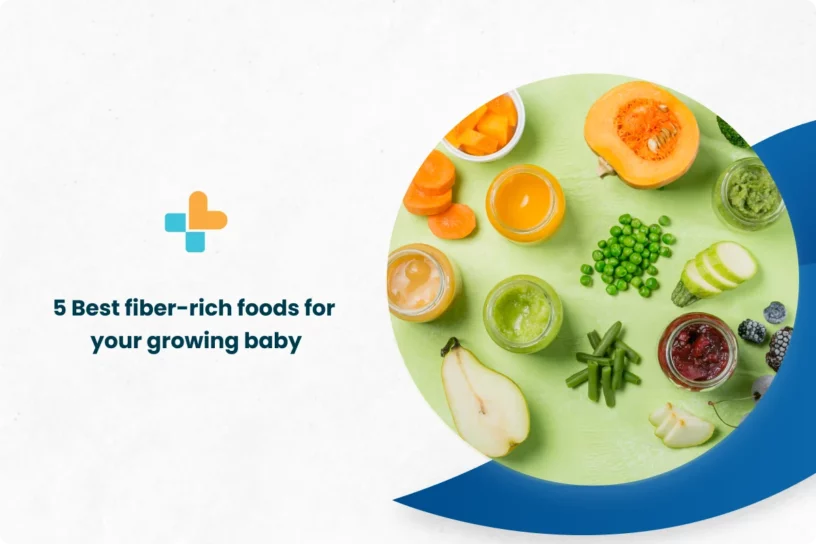Introduction
As your baby grows and starts to eat solid foods, it’s important to ensure that they are getting the proper nutrients for their development. One important nutrient for babies is fiber, which can help with digestion, weight management, and overall health. In this article, we will discuss the benefits of fiber for babies, how much fiber they need, and the best fiber-rich foods for growing babies.
Is Fiber Good For Babies?
Fiber is an essential nutrient for babies, as it promotes healthy digestion, helps prevent constipation, and can aid in weight management. It can also help lower the risk of certain chronic diseases such as obesity, type 2 diabetes and heart disease.
How Much Fiber Do Babies Need?
The recommended amount of fiber for babies depends on their age and weight. According to the American Academy of Pediatrics (AAP), babies aged 6-12 months should consume at least 2-3 grams of fiber per day.
Precautions To Take While Introducing Fiber Foods
It is important to introduce fiber-rich foods to your baby gradually and watch for any signs of discomfort such as gas or constipation. Also, it is recommended to start with small amounts and increase the serving size over time. It is also important to make sure that the baby is drinking enough water, as fiber needs water to properly function.
Uses Of Fiber For Babies
Fiber helps regulate digestion, which can help prevent constipation and diarrhea, and also helps keep babies feeling full and satisfied for longer periods of time. Fiber also helps lower cholesterol levels and blood sugar levels, which can help prevent chronic diseases.
High Fiber Foods For Babies
1. Grains (and cereals)
Whole grain breads, cereals, pasta, and rice are good sources of fiber for babies.
2. Vegetables
Vegetables such as broccoli, peas, and sweet potatoes are excellent sources of fiber for babies.
3. Fruits
Fruits like berries, apples, and pears are good sources of fiber for babies.
4. Dried Fruits
Dried fruits like apricots, figs, and raisins are also good sources of fiber for babies.
5. Pulses and Legumes
Pulses and legumes such as beans, lentils, and chickpeas are high in fiber and can be introduced to babies as they start to eat solid foods.
Possible Side-Effects Of Excessive Fiber Intake To Babies
While fiber is essential for babies, excessive intake can cause gas and bloating. It can also cause diarrhea or constipation if not monitored.
Ways To Include High Fiber Foods In Baby’s Diet
For babies five to six months old
Sweet Potato Puree
Cook a sweet potato and mash it up with a fork or a blender. This puree can be mixed with breast milk or formula for a delicious and nutritious meal.
Banana Puree
Mash a ripe banana and mix it with breast milk or formula. This puree is easy to swallow and digest for babies just starting on solids.
For babies 6-12 months old
Veggie Lentil Soup
Cook lentils and vegetables such as carrots, celery, and potatoes in a broth. Puree the soup for babies or leave chunks for babies who are starting to eat table food.
Yummy Roasted Vegetables
Roast vegetables such as sweet potatoes, carrots, and broccoli with a little olive oil and seasonings. These can be mashed or offered as finger foods for babies to practice their self-feeding skills.
Conclusion
Fiber is an essential nutrient for babies, as it promotes healthy digestion, helps prevent constipation, and can aid in weight management. It is important to introduce fiber-rich foods to your baby gradually and watch for any signs of discomfort. Whole grains, vegetables, fruits, dried fruits, and pulses and legumes are excellent sources of fiber for babies. However, it is important to keep in mind that excessive intake of fiber can cause gas, bloating, diarrhea or constipation, it is important to follow the recommended amount of fiber intake for babies and always consult a healthcare professional for guidance.
FAQs:
- How can I increase my baby’s fibre?
There are a number of ways to increase your baby’s fiber intake:
- Introduce high-fiber foods such as fruits, vegetables, whole grains, and legumes to your baby’s diet.
- Gradually increase the amount of fiber in their diet.
- Make sure your baby is drinking enough water to help with digestion.
- Consult with your pediatrician or a nutritionist for personalized advice.
2. What is a natural fiber for babies?
Natural fibers for babies include fruits and vegetables, whole grains, and legumes. These foods are high in fiber and also provide other important nutrients for your baby’s growth and development.
3. What vegetables are high in fiber for babies?
Vegetables that are high in fiber for babies include:
- Peas
- Sweet potatoes
- Carrots
- Squash
- Broccoli
- Spinach
- Cauliflower
- Green beans
4. How do I give my 1-year-old fiber?
You can give your 1-year-old fiber by introducing high-fiber foods such as fruits, vegetables, whole grains, and legumes in their diet. You can start with small amounts and gradually increase. You can also make sure they are drinking enough water to help with digestion. It’s important to consult with your pediatrician before making any dietary changes for your child.
Our Hospital Locations
Pediatrics Surgery Hospitals in Chandigarh | Pediatrics Surgery Hospitals in Bangalore | Pediatrics Surgery Hospitals in Jaipur | Pediatrics Surgery Hospitals in NCR | Pediatrics Surgery Hospitals in Hyderabad
Our Doctors
Pediatrics Surgery Doctors in Chandigarh | Pediatrics Surgery Doctors in Bangalore | Pediatrics Surgery Doctors in Jaipur | Pediatrics Surgery Doctors in NCR | Pediatrics Surgery Doctors in Hyderabad
About the Author

Dr. S. Goel
Dr. S. Goel is a renowned Internal Medicine Specialist currently practicing at Ayu Health, Bangalore. He is a Specialist in Internal Medicine, Diabetes HTN, Paediatric Care, and Family Medicine.




